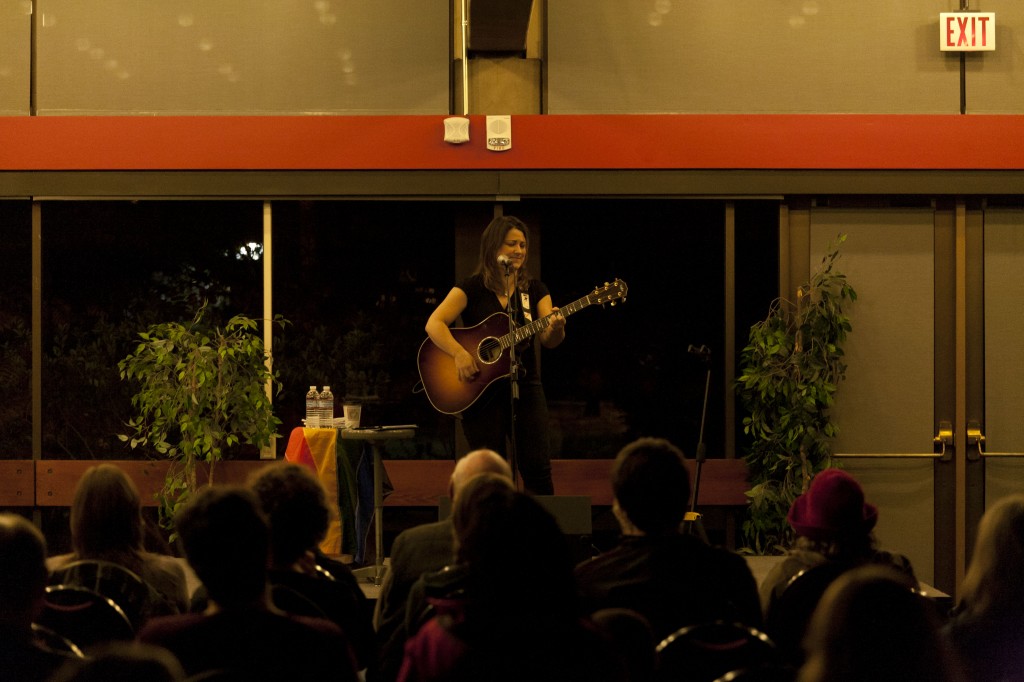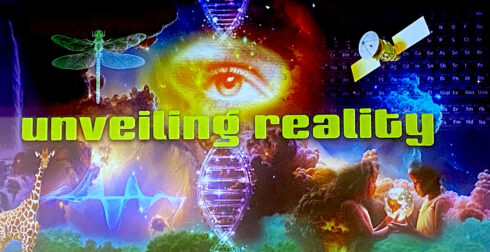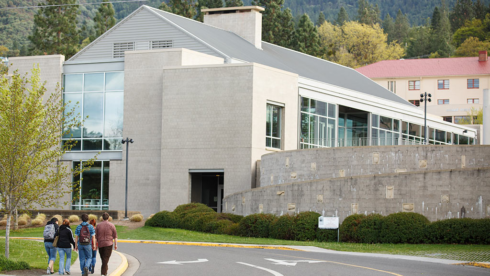
Jennifer Knapp, a Grammy-nominated singer well-known in the faith-plus-entertainment subculture which includes the Contemporary Christian Music genre, performed Wednesday night in the Stevenson Union on the Southern Oregon University campus as part of her “Inside Out Faith Tour.”
The concert was introduced by Adam Walker Cleveland, associate pastor of First Presbyterian Church of Ashland, which helped organize the event in cooperation with the Ashland First Congressional United Church of Christ, Ashland’s Trinity Episcopal Church, and the First United Methodist Church of Ashland.
“I’ve been listening to Jennifer since when I was in college,” said Cleveland. “I was what you might call a Jennifer Knapp groupie.”
Knapp is not your average Christian musician though.
Knapp’s tour promo describes her as “a gay person of faith.” Her tour is geared specifically at building “a positive and constructive dialogue on behalf of LGBT people of faith,” by sharing her personal story of how she has tackled the challenges that come from being both openly gay and a Christian entertainer who has been criticized for her sexual orientation by some segments of the religious audiences to whom she markets herself.
Knapp, 38, exhibited a strong sense of humor at the show, co-sponsored by SOU’s Queer Resource Center. “You might have heard, but I actually play music for a living,” she said. She also joked around with audience members.
“Can I keep you?” she asked a girl who called out from her seat that she loved Knapp. “Now, she’s a girl and I’m a lesbian. I guess I have to be careful what I say now,” Knapp said.
Knapp kicked off with a performance of “A Little More,” her hit song which describes the basic tenets of Knapp’s religious beliefs, specifically her belief that God’s grace is more than she deserves or can give others.
“For all the sin that lives in me, it took a nail to set me free / Still what I do I don’t want to do and so goes the story,” she sang.
She proceeded to alternate between sharing short biographical vignettes and anecdotes and performing her music, each story building on the previous and each song relating lyrically in some way to the story just told.
Knapp said she converted to Christianity as a college student, after befriending Christian classmates who invited her to church. Her conversion was motivated by a desire to find value and meaning in her life, which she said she could not find due to very low self-esteem.
“One day Christianity made a lot of sense to me,” she said. “I thought, who am I that God would see me as valuable enough to save me? Then I learned there was a verse that said that very thing.”
“I came [to Christianity] as a girl of the world, not a virgin . . . I would leave church services, light a cigarette in the parking lot, and say, ‘That was fucking awesome.’ Long story short, I became a Christian rock star.”
The pop culture phenomenon of Contemporary Christian Music, or CCM, of which Knapp is a part, is an emulation of the kind of fare offered by secular pop and rock radio.
In the mid- to late 1960s, the church decided it would serve as a great evangelistic tool, as well as a wholesome alternative to “worldly” music. Christian radio, complete with guitars, drums and solos, was born in the 1970s. By the late 1990s, CCM had achieved a significant reputation as a corporate force to be reckoned with, its records selling better than classical, jazz and New Age music combined.
By that point, CCM was also addressing social issues that sometimes came into conflict with religious principles. The “Inside Out Faith Tour” is one of the latest examples of this commentary.
Knapp described having conflicting feelings about her sexuality early on in her career.
“I uploaded all my confusions into my songs, all my passions into my songs,” she said. “I knew nothing about love, but I kept looking to my faith to tell me about that love.”
This confusion was reflected in songs such as “Whole Again,” a song Knapp performed at the event which came from early in her career.
The emotion in Knapp’s performance was on display as she sang, “Am I lost in some illusion, or am I what you thought I’d be? Now it seems I’ve found myself and need to be forgiven.”

She sang a song called “Say Won’t You Say,” the chorus of which referred to “love everlasting,” as an example of a song she said she wrote without understanding what her subject was all about.
Two of the songs performed hail from her latest album. The album, titled “Letting Go” and released in 2010, marked a watershed moment in Knapp’s career. It was the first effort after coming out as a homosexual and her first work produced following a long hiatus that started in 2003, when she traveled to the Australian outback where she lived for the next seven years.
“I literally had my wilderness experience,” Knapp said, adding that her seven-year stay in Australia was a retreat from the religious community in which she was involved. Her hope was, she explained, to find personal space in which to reflect on whether she wanted to retain her faith in light of her homosexual orientation.
She described this period as one in which she “dared God” to love her as she was. Her career hung in the balance pending what she believed God’s answer would be.
Knapp said the question of whether a person can be both gay and a Christian is one that is not often raised in liberal settings, where the answer is almost always an obvious yes.
“I am probably preaching to the choir here,” she said.
But for many others, especially those outside higher education environments, the question is a subject of serious debate among religious believers and of raised eyebrows among the religiously-uninitiated or non-believing.
“My redneck, middle class family in Kansas was actually relieved [when I came out to them], because they thought this whole Christian thing of mine would go away. It didn’t,” she said, illustrating the sense even non-religious people have that there is a contradiction in being gay and a person of faith.
However, by the end of Knapp’s hiatus, she had put faith in more than God. She put faith in her religious community to be understanding and accepting of her sexual orientation.
“I wouldn’t have come back and continued singing and writing songs if I knew Christian bookstores were going to pull my records off their shelves. I wouldn’t have tried,” said Knapp, who went on to describe her coming-to-terms with both keeping her Christian faith and in coming out as gay to her fan base.
But not all of Knapp’s fans at the concert were supportive of Knapp’s homosexuality.
“I really think it’s an abomination. It’s a sin,” said Jon Clement, a laser manufacturer from White City who said he attended the concert because he had listened to and enjoyed Knapp’s music over the years.
He said Knapp’s sexual orientation does not change his opinion that “she has a wonderful voice and a good stage presence.”
“But I don’t think she takes the Bible as true,” he said. “She picks and chooses.”
“She’s broken the second commandment because she makes God in her own image. She winks at sin, because she alluded to smoking and drinking.”
Clement went on to say he was not prejudiced against gays.
“God extends his hand to homosexuals, hoping they’ll come out of that sin,” he said.
But Knapp expressed concern over the fact that three-fourths of all anti-gay rhetoric come from religious sources, citing a recent study by the Gay & Lesbian Alliance Against Defamation research group, in conjunction with the University of Missouri, in support of this claim.
Her concern was that gay people of faith would feel obliged to quit their faith because of this rhetoric, as she herself almost did.
After the concert, Knapp had no comment on what Christianity or the Christian Scriptures had to say on the subject of homosexuality, pointing out that there are over 3,000 denominations of the religion, many of which have differing beliefs about homosexuality, from affirming to condemning and everywhere in between.
“Those who are outside Christianity would look on all these denominations as sects,” she noted, going on to describe her desire to transcend sectarian differences.
“God made me a singer. That’s my gift to the universe. And I’m attractive,” Knapp concluded, summarizing in a nutshell what her long process of self reflection and discovery led her to accept.





The concert was fantastic. I too am a person of faith who is also gay. Jennifer’s story helped me to realize that I was not the only one who was rejected by “the church” for being who God created me to be.
The “church” wants to be righteous bigots, which is in total contrast to who Jesus is, and what His ministry is all about.
John 3:16 states “For God so loved the world that He gave His only son, that whoever believes in Him shall not parish but have everlasting life”.
Sandy and Shelly
I think Jennifer did a great job of entertaining at the concert, and is a very good speaker.
I didn’t get a chance to ask her what she meant by “Christian”, since her definition of that word was different than what the Bible describes. It does beg the question, “Can there be “Christian” pedophiles, or bestiality? Where does it stop, if you aren’t using a standard? (the Bible).
The Apostle Paul wrote to the Corithians,
“Do you not know that the wicked will not inherit the kingdom of God? Do not be deceived: Neither the sexually immoral nor idolaters nor adulterers nor male prostitutes nor homosexual offenders nor thieves nor the greedy nor drunkards nor slanderers nor swindlers will inherit the kingdom of God.
And that is what some of you were.
But you were washed, you were sanctified, you were justified in the name of the Lord Jesus Christ and by the Spirit of our God.” (1 Corinthians 6:9-11)
What Paul is saying, is that homosexuality isn’t a unique sin, and that people can repent (change their minds), through the Holy Spirit’s touch on their lives.
After hearing Jennifer’s story, it was clear that she had never repented, the Bible says “Repent, then, and turn to God, so that your sins may be wiped out, that times of refreshing may come from the Lord” -Acts 3:19
So, in order to approach God Almighty, you must have your sins forgiven through Jesus Christ’s atoning blood on the cross. It was full payment for your sins.
That’s what is called the “Good News” or Gospel.
What I hope comes across to homosexuals is that the church (true believers) really loves you, cares about you, and your eternal destiny. We don’t want you to end up in Hell; that would be horrible.
So, we shouldn’t discriminate against homosexuals, as we are all sinners. But at the same time we need to warn of the dangers of staying in sin.
Most people would say they are a good person.
So, as a challenge, please take the “Good Person” test, if you dare, as directed below and please comment:
Thanks,
Jon
Thanks for the article about the Inside Out Faith Tour with Jennifer Knapp. We were very happy with the event, and the turnout. From conversations that I had with folks after the event, it seems like what Jennifer shared really touched a lot of people.
I appreciate you giving Jon Clement an opportunity to share his perspective, but perhaps it would have been helpful to interview someone else, perhaps a clergy person, to hear their perspective as well.
I will say that I do NOT believe homosexuality to be an abomination. It is not a sin. And if Mr. Clement felt that Jennifer doesn’t believe the Bible, or that she picks and chooses, perhaps he should have asked her a question about how she deals with scripture. As I mentioned at the event, Jennifer was open to any and every question.
There are plenty of Christians, myself included, who believe the Bible, who take the Bible very seriously, yet do not agree with the traditional interpretation of just 7 verses in Scripture that people say speak about homosexuality.
If you are interested in a different interpretation of some of these verses, I’d recommend a blog post I wrote about Jack Rogers’s book “Jesus, the Bible and Homosexuality.” It’s one of the best books out there on the topic.
http://pomomusings.com/2009/01/19/jesus-the-bible-homosexuality-chapter-5/
Thanks for your feedback. I would have liked to get the perspective of a clergy member such as yourself from one of the co-sponsoring churches. Clement’s perspective was the result of an unexpected interview that I had not anticipated getting for the story, almost an hour after the event was over. This is why I included Knapp’s statements about three-fourths of anti-gay rhetoric coming from religious sources and the concern that entails for gay people of faith such as herself, and also her comments regarding sectarianism and the near-futility of navigating those lines of dissent to everyone’s satisfaction, especially when things as personal as one’s sexual orientation is concerned.
Thanks Nathan for your coverage of this event. It sounds like you really tuned into what Jennifer said during the concert.
I remember what Jennifer said about denominations of Christianity, and how even “non-religious” people would see the contradiction (the Bible uses the word hypocrisy) of being a homosexual and claiming to be a Christian as well.
Hypocrisy, or the perception of hypocrisy, is one of the chief complaints among non-Christians against church-goers or “Christians”. One of the facets of that complaint to consider, is that not all those attending church (even a particular church) are Christians (e.g. converted, born again, repentant). So, as it’s been said, it’s impossible to be good without God (that is the saving knowledge of Jesus Christ). Again, that goes back to a Biblical definition of the term “Christian”.
One of the reasons there are many churches that claim to be Christian, is their stance on the Bible; many do not believe that the scriptures are inspired and inerrant. That leads to all sorts of different interpretations of essential doctrine (that pertaining to salvation), that will lead people either to the heaven or hell.
So, like Jennifer, those who want to justify certain sins, choose a denomination that condones that sin. Although Jennifer said she didn’t belong to, or associate with a particular denomination, nor did she attend church regularly. Mr. Cleveland stated that he doesn’t believe homosexuality is a sin because of the “traditional interpretation of just 7 verses of scripture” that people say speak against homosexuality. So, it’s appears very hypocritical when you have a minister that promotes this type of behavior, yet claims to “take the Bible very seriously”.
I’m not sure what “..the concern that entails for gay people of faith..” means, unless you’re referring to people threatening or harming homosexuals. That is not all my position, nor the Bible’s stance. Christians are to reach out in love to all those in sin, warn them of the danger they’re in, and share with them the Gospel, that is “..that Christ died for our sins according to the Scriptures, that he was buried, that he was raised on the third day according to the Scriptures (1Cr 15:3,4).
That’s great news!
In response to Mr. Cleveland,
I’m sorry to hear that no one else was interviewed by Nathan. That was probably a result of my spending a lot of time talking to him. I would have been good to have more people’s perspective on it.
It was very clear that Ms. Knapp does not hold to the authority of scripture, so that was one thing I didn’t need to ask her.
I did want to ask Jennifer some questions, but the time was limited, and lots of people had questions, so I wasn’t forward enough to get a chance at the microphone. These were the questions I would’ve asked:
1. What is your definition of “Christian”, and why do you prefer “person of faith”?
2. Do you consider yourself a good person?
3. Do you obey the Ten Commandments?
What I’m noticing, is that we are using words with different definitions, such as “Christian”. What is your definition of “Christian”?
What is your definition of the word “God”?
Who is “Jesus Christ”?
What is “Hell”?
Defining terms will help the discussion move along, and prevent confusion.
It will really help also to have the perspective that if the Bible really is true, sin is real, and hell is described even somewhat accurately, then it is terrifying to think what will happen to those that have not had their sins forgiven.
I pray that you would consider this from my point of view, because of the terrible consequences if you’re wrong. If I’m wrong, I won’t even be able find out.
That is the motivation for me to try to convince you of the truths of the Bible.
Here are some resources to check out from Joe Dallas, a former homosexual.
He does a good job of explaining this sin biblically and practically.
http://www.equip.org/audio/questions-and-answers-with-hank-and-interview-with-joe-dallas/
Thanks for your comments,
Jon